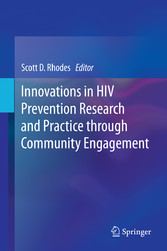Suchen und Finden

Innovations in HIV Prevention Research and Practice through Community Engagement
HIV continues to be a profound challenge facing communities nationally and internationally. Until a vaccine or a cure is found, prevention remains a most crucial line of defense. However, the successes made to reduce exposure and transmission have not benefited all communities equally. HIV continues to affect vulnerable communities, and HIV-related health disparities are growing.
The work documented in Innovations in HIV Prevention Research and Practice through Community Engagement spotlights the effectiveness of community involvement to reduce HIV infections in the United States. This timely resource introduces the concepts of community engagement, partnership, and community-based participatory research (CBPR). Contributors provide detailed examples of these concepts in which diverse research partners blend their unique insights and skills to arrive at an authentic understanding of phenomena and inform the translation of best practices and processes to enhance equity in HIV prevention and treatment. Equitable interactive collaboration is central to these efforts, in which community members and representatives from organizations, the scientific and medical sectors, and other relevant agencies nurture long-term health improvement through sustained teamwork. Challenges and barriers to effective engagement are identified, as are characteristics of successful partnerships. Included in the book:
- Details of a multigenerational HIV prevention intervention in a rural southeastern community.
- The challenges and successes of developing, implementing, and evaluating an intervention for higher-risk predominately heterosexual black men in college.
- The history of gay community involvement in HIV prevention and its contributions to the theory and current practice of engagement.
- Next steps in the integration of HIV-related policy change and research.
- Community engagement within American Indian communities.
- Keys to sustaining a CBPR partnership to prevent HIV within ethnic, sexual, and gender minority communities.
Innovations in HIV Prevention Research and Practice through Community Engagement offers researchers and practitioners in public health, community health, and medicine guidance on community engagement that is both inspiring and realistic.
'Community engagement and knowledge continue to be essential to prevent HIV infections. This book is a compilation of the state-of-the-science of engagement and delves deeper into the meaning and utilization of community-based participatory research, with implications that reach beyond the HIV epidemic to public health and medicine in general.'
- Laura C. Leviton, PhD, Senior Advisor for Evaluation, Robert Wood Johnson Foundation, Princeton, NJ
Scott D. Rhodes, PhD, MPH, CHES, is a public health scientist, whose research focuses on the integration of community development and health promotion and disease prevention interventions in both rural and urban communities. Specifically, his research explores sexual health; HIV and sexually transmitted disease (STD) prevention; and health disparities among vulnerable communities. Dr. Rhodes has experience working with Latino communities; urban African American adolescents; persons living with HIV and AIDS; men of color; self-identified gay and bisexual men; and men who have sex with men (MSM). Dr. Rhodes has extensive experience in community-based participatory research (CBPR); the design, implementation, and evaluation of HIV prevention interventions, community capacity development, and environmental and policy change; the application of behavioral theory; photovoice as a methodology of participatory action research (PAR); lay health advisor approaches; the exploration of sociocultural determinants of health; and internet research, including data collection, intervention delivery, and evaluation.
Alle Preise verstehen sich inklusive der gesetzlichen MwSt.







